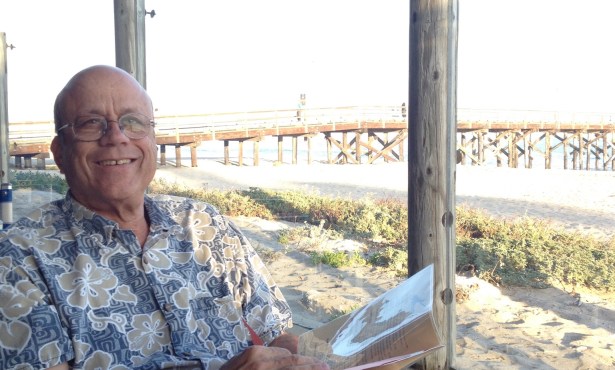Expanding Our Notion of Existence
A Conversation with David Brin
Finding a good novel gets harder and harder the older I get. Part of the problem is that I read mostly non-fiction and I find that most fiction doesn’t have the “meat” that I’m looking for in non-fiction. That is, much of what comprises fiction is stuff I tend to skip over because I’m generally reading for what I consider to be the most important points!
I realize that this is no way to enjoy a good story. However, I think that for a lot of us who fall into this same category, the science fiction genre still holds some hope of keeping our attention.

I recently listened to David Brin’s latest novel, Existence, a very large novel – in ideas, content, and pages – about the not-too-distant future of humanity. It hooked me right away and I’ve been running a lot more lately because of my looking forward to listening to the novel. Now I’ve finished it I’m not sure I can find a similarly enthralling listen.
David Brin first hooked me as a teenager almost 30 years ago when I read his Uplift series of novels – Sundiver, Startide Rising and The Uplift War. Brin’s Uplift series is a classic now, and he won one of science fiction’s highest honors, the Hugo Award, twice for this series, along with many other awards. Brin is also a working scientist, with a Ph.D. in space science from UC San Diego (also my alma mater). His website contains a lot of content on topics from science to science fiction to politics.
Brin is considered one of the more prominent hard sci-fi writers today and he firmly believes that good sci-fi should explore themes that are relevant to all of us. Existence explores a number of scenarios regarding alien contact – a perennial sci-fi theme. His ideas, story, and conclusions are, however, quite new. I highly recommend the book.
I had the pleasure of interviewing Brin via email, the first novelist in my series of interviews with authors.
Your novel Existence is a big story in the ‘hard sci-fi’ genre, and it’s really well done. It’s highly entertaining and suspenseful, and also quite believable. It’s a novel of ideas set in the not-too-distant future, and I’m curious about what inspired the novel and about your decision to make it as much, or perhaps more, about ideas than about traditional plot arcs.
Of course Existence was a difficult project to write and especially to make smooth and easy for the reader. In order to portray richly the world of 2048, I go back to the juggling act that worked so well in Earth [a previous Brin novel]. This method – citing fictitious news accounts, books, and arguments between the chapters — got its start with the novel USA by Dos Passos and was brought to stunning fruition by the titan of 1960s science fiction, John Brunner, in his fantastic Stand on Zanzibar, a work that deeply inspired me, using many characters and media extracts to give a sweeping panorama of a world we may yet live to see
Existence is centered on the discovery in earth orbit of a football-sized alien probe, and the dialogue with other races that ensues. Do you think this is in fact the most likely scenario for alien contact, if and when it happens?
I have explored concepts of human contact with the alien in my work as an astronomer, surveying such possibilities in our galactic neighborhood and through involvement in the SETI program. As it happens, such contact might not happen first via radio waves. There are serious calculations suggesting that physical probes, small, compact, and long-lasting, might be a principal means by which species make others aware of them. I explore this possibility, in a wide range of possible ways.
What is the likelihood, in your view, that there are artifacts, like the ones you write about in your novel, in Earth orbit right now? Or elsewhere on our planet?
Landing on Earth might be a challenge for such probes, but it has long been pondered whether some – perhaps millions of years old – might be “lurking” in, say, the Asteroid Belt or under the surface of the moon. It is a remarkably efficient approach and one that Arthur C. Clarke explored a little in 2001 A Space Odyssey. I merely explore it in further detail, using the best science we’ve come up with, so far.
Do you think it’s at all likely that we are in fact alone in our galaxy, as an advanced civilization? Are we cosmically alone?
It’s a daunting possibility, isn’t it? Either way – if we seem to be alone, or if we make contact with neighbors out there – either way, the universe is sure to be unnerving as we forge outward. No wonder some of our fellow citizens quail from thinking about the cosmos, or the future, and some even deny there will be a future at all. It arises from a desperate unwillingness to think about the grand context for all our little struggles.
What is your process for writing a big novel like this one? Do you have research staff?
I do all my own research. And most of it consists of just one thing: being interested in absolutely everything. I highly recommend it!
Let’s dive into some of the big themes covered in your book (no spoilers yet). I was really intrigued by your discussion of “smart mobs,” which are virtual mobs that provide information or advice as requested, based on the statistically most popular answers provided by the mob. How is this different than searching Google today? Is it the active choice of which mob to consult that makes it different? Or the possibility of having a mob along with you as you engage in activities that require advice?
The smart mob concept assumes that a certain fraction of the population will grow tired of just relying upon Google, YouTube, and snarky jpeg slides that they share on Facebook. That is not what skilled professionals do, say the police when comparing notes with each other to solve a crime, or CIA officers pooling their expertise to hunt down a terrorist. Or top Wall Street firms analyzing which companies will rise or fall. These professionals use advanced analytical tools and share data with each other across the world, at lightning speed. They build models of real-time events in which dozens or even hundreds of consultants and team members each contribute some special knowledge or skill.
I never cease to be amazed, in times of rapid change, how people cling to the notion that further change won’t happen. But all of those analytic and collaboration skills will eventually reach amateur and private hands. The way video photography reached us in recent decades. Most of us will ignore the power of these tools. But millions will grab and use them.
You’ve described yourself as a “heretical libertarian,” so how do you see the libertarian ideals of smaller government and greater freedom unfolding in the next few decades? You discuss in your book how the new oligarchy, made possible by the extreme disparities in this country and others, may lead away from more democratic forms of government.
Today’s main branch of libertarianism has turned an intellectual movement into a brainless thing. “I’m for liberty!” is the shouted credo, followed by the relentless implication that “government” is the only possible threat to that liberty. What they thus do is: (1) imply that other people aren’t for liberty, a grotesquely self-serving insult. And (2) they ignore 6,000 years of human history, in which 99% of cultures saw freedom and markets destroyed not by government bureaucrats, but by inherited owner oligarchies. But today’s movement is led by folks who desperately ignore that fact.
Instead of waving the vague apple pie image of “liberty” (yes, we are all for it – well, most of us are) we should take the love of freedom as something shared by many. So what separates (true) libertarians [from the inauthentic type common today]?
I suggest the following: an appreciation of competition, the most creative force in the universe, the force that made us, that propels evolution, markets, democracy, and science. It is the only thing that ever cuts through the human penchant for self-delusion. There we see a split, all right. The left emphasizes cooperation – another admirable human trait, but steeped in problems. The right keeps trying to deliver us back into the hands of owner oligarchs. A true libertarian movement would actually read Adam Smith and realize that our Enlightenment must defend the competitive arenas of markets and democracy and science that gave us everything.
And if you think about it, you realize that government often helps competition. And idolatry of unlimited personal wealth often hurts it.
You discuss in your novel the “diamond class” model that seems to be your ideal social model, in which a large middle class (the bulge in the diamond) narrows in numbers as we go up in income (the top of the diamond) and narrows similarly to the bottom as we go down in income (the bottom of the diamond). What policies today, political, technological, economic, etc. do you think will ensure that the diamond class ideal continues, and improves, into the future?
Government policies helped make the American middle class. In the 1930s it seemed the United States would tumble into class war and either communism or fascism. We were rescued by our native practicality, plus a man who helped us create the flattest social order in human history – Franklin Roosevelt. After FDR, in the 1950s and under high tax rates, the middle class boomed and market investments created a spectacular creative capitalism. Yet we are now told, relentlessly, that he was Satan. Funny thing, the Greatest Generation adored him.
I am not approving of all things FDR did. But careening back into feudalism is not the way to fix things.
Your book is, in some ways, a re-telling of the Pandora’s box cautionary tale about the perils of knowledge and technology. You also suggest (though not without much hedging) that advanced civilizations can’t last very long. Certainly the history of civilizations on our planet supports this view, but isn’t there a good possibility, if we survive the next few decades, that our probes and some (possibly a great many) individuals will escape this beautiful planet we call home, on a permanent basis, and before too long spread far and wide in our solar system and eventually to nearby stars?
I see nothing in your question to disagree with. Except that I think we will manage (barely) to grow up in time to not only take the stars, but save ourselves and our planet. And save freedom at the same time.
You also suggest (spoiler alert, watch out) that the future for advanced civilizations may be entirely virtual. Is this in your view a likely future for humanity? Or are you more optimistic that we can live a more corporeal existence far into the future, as well as living in parallel virtual realities if we choose to do so?
Sounds good to me! Every decade that I live, there is some great new idea that expands our concept of the possible. Blending science and fiction and history and curiosity – it’s fun!
Stephen Hawking made news last year by suggesting that space-faring alien species are more likely than not to be hostile to us, much as the history of human civilization has revealed scant regard for weaker human populations. I’m inclined to agree and, if this is the case, it would weigh heavily in favor of us doing everything we can to not advertise our presence, at least until we are far more technologically advanced. Do you agree?
I found Professor Hawking’s particular scenario to be very unconvincing. But that does not matter. There are more than a hundred theories to explain the Fermi paradox regarding why the skies seem so empty of civilizations that ought to be out there. And three-fourths of those theories are at least disturbing, some of them downright scary. That is not to say that we shouldn’t stay optimistic! I support the SETI search – but not recent foolish efforts to shout into space. Listening is not shouting.
For (much) more, see “>articles and speculations by David Brin about the Search for Extraterrestrial Intelligence (SETI).
How do you think rejuvenation/immortality technologies will unfold? You don’t seem to believe that thinkers like Ray Kurzweil, who suggest that biological immortality may just be a couple of decades away, are right.
The folks who think we are about to become immortal may turn out to be right. Many of them are very clever and some interesting science is spilling forth. Still, their passion is familiar from 6,000 years of transcendentalists shouting promises that were never kept. In Elsewhere, I go into a dozen reasons why extending human lifespan by more than a decade or two may be harder than we thought.
You discuss some scenarios in which certain types of alien probes may mutate into all-consuming artificial viruses, eating up everything in their path – kind of like Galactus, the world-devouring bad guy in the Fantastic Four comic books. It seems that since this hasn’t happened yet, in 14 billion years or so, that it’s unlikely to happen now. Or is this view too Pollyanna-ish?
The simplistic eat-everything alien probe was never mine. It is an old cliché and yes, the existence of the Earth we are standing on disproves it. But there are much more subtle forms of predation and some might arise out of basic misunderstandings. If we are to avoid such errors, it would be wise to first think them through. That is one purpose of high-level science fiction.
You made me laugh out loud in your discussion of relic fragment lawyers, artificial attorney bots, essentially, since I’m one of the old school carbon-based lawyer types. How far are we from having expert systems sophisticated enough to replace many duties commonly performed by lawyers, doctors, or sci-fi authors?
I haven’t a clue. It may already have happened and we are living in a simulation. Or else it may be that modeling the human mind is much more complicated than anyone expected. It is that vast realm in between that seems worth exploring: the realm of idea space.
You discuss the possibility of simulated worlds, and this idea has taken off since the Matrix movies. It’s an intriguing notion and it seems that we could never rule out the possibility that we are living in simulation. That said, could we ever devise tests (something a bit more realistic than red pill/blue pill) to probe our reality and find out if we are in fact living in a simulation?
There are a few tests. Alas, so far all of them are favoring the simulation theory. Like the weird fact that the universe has an upper speed limit. (The speed of light.) It effectively limits the size of the needed simulation space, which is what super beings would have to do, to save resources. There are half a dozen other traits of our cosmos that make us physicists go, “Huh! Well, maybe …”
Last, what is your advice for aspiring sci-fi authors?
What I can do is point you to an “advice article” that I’ve posted online, containing a distillation of wisdom and answers to questions I’ve been sent across 20 years. (Note, most authors never answer at all.) Many people have found it extremely helpful.
Sci-fi is the literary genre that explores possibilities and the effects of change upon human beings. Any genre that doesn’t contemplate how things might be different and how people might react – of what value is such navel contemplation in such times as these? Well, I suppose cowardly agoraphobia has its place. But I have the universe and time and the human mind and soul and heart as a playground. Why limit myself?



